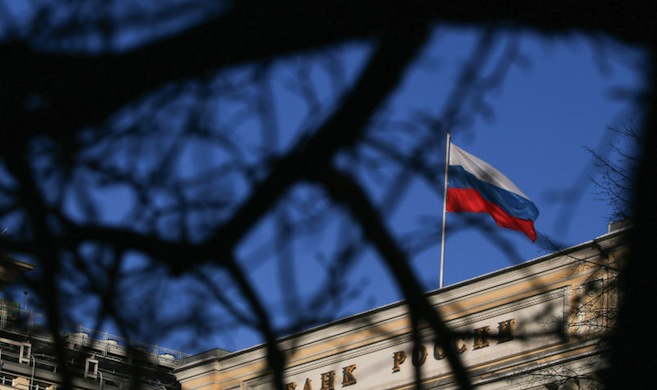Ukrainian Banks Move To Sue Russia
"I'll see you in court!"

MADRID: The world responded to the crisis in Ukraine with punishing Russia, blaming the country for creating discord and “annexing” Crimea. Punishment was meted out in the form of crippling economic sanctions and widespread international condemnation.
Now, two of Ukraine’s major banks have found another way to try and punish Russia for its role in the Ukraine crisis: They are suing the Russian government for the financial losses they incurred after Crimea moved to join the Russian Federation.
Ukraine’s largest bank Privatbank announced its decision to sue Russia earlier this week, saying it had kicked off international arbitration proceedings to seek an unspecified amount from Russia after being forced out of Crimea. Before Crimea’s accession to Russia, Privatbank operated 337 branches in the region and accounted for 30 percent of the deposits.
An article in local Ukrainian paper Pravda quotes Privatbank’s spokesperson saying “the arbitral tribunal will be formed to carry out the proceedings in accordance with the Arbitration Rules of the United Nations Commission on International Trade Law ("UNCITRAL").”
Hours earlier, the state run Oschadbank filed a lawsuit against Russia for the losses from the loss of activity in Crimea. The decision was announced by Ukrainian Prime Minister Arseniy Yatsenyuk who said that Oschadbank would demand $700 million from Moscow.
Kiev maintains that the accession of Crimea to Russia has caused major economic losses, with the country’s Ministry of Justice in 2014 releasing a figure to the tune of $45.5 billion in losses.
Whether Ukraine will have any luck in getting compensation for any of this remains to be seen. However, precedent may be an indication of what might happen. Last year, an international arbitration court in the Hague -- the same court in which Privatbank’s case against Russia may be heard -- ordered Moscow to pay $50 billion to former shareholders of Yukos oil company, which had been nationalised over a decade ago.
The precedent means that Ukraine may see a verdict in its favour. However, Russia still hasn’t paid up in the Yukos oil company case, and that part of the precedent is equally important.
Russia, on its part, is probably not too bothered. The country maintains that it had no role to play in the crisis, and that Crimea’s decision to accede to the Russian Federation was determined by popular will.
In fact, that’s the official Russian story for the entire Ukrainian crisis, whereas the US-backed government in Kiev blamed Russia for not just Crimea’s decision to split with Ukraine, but also for the discord in the east, specifically in the areas of Kharkov, Odessa and Donetsk.
In line with these differing interpretations, the US-led western powers have supported Kiev’s use of military action against protesters, while Russia has condemned it with Russian President Vladimir Putin expressing concerns that the situation could escalate into a civil war.
Meanwhile, fighting in Ukraine continues -- over a year after Crimea moved to join the Russian Federation. The United Nations recently released a statement saying that the “humanitarian crisis in Ukraine is continuing to deteriorate as the number of Ukrainians in need of assistance has now reached a total of five million people.”
Addressing a press briefing held on 10 July, Jens Laerke, of the UN Office for the Coordination of Humanitarian Affairs (OCHA), told reporters that almost 1.4 million people were internally displaced while another 3 million remained in non-government controlled areas. Both groups, he said were prioritized for humanitarian aid.
In late February 2014, the situation in Ukraine transcended what was initially seen as an internal Ukrainian political crisis into violent clashes in parts of the country, later reaching full-scale conflict in the east. Nevertheless, despite a September 2014 cease-fire agreed in Minsk, the fighting has since continuously deteriorated, with serious consequences for the country's unity, territorial integrity and stability.
In this scenario, the concerns of Ukraine’s banks are only a small part of the problem.



